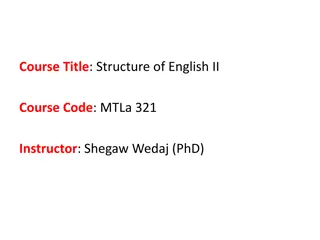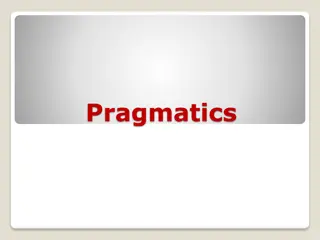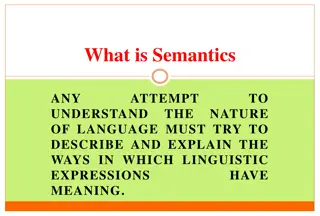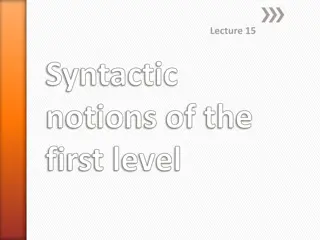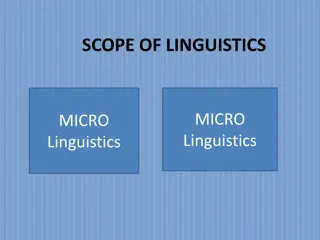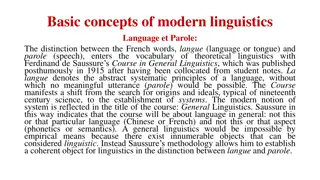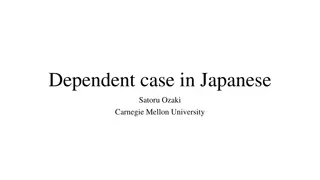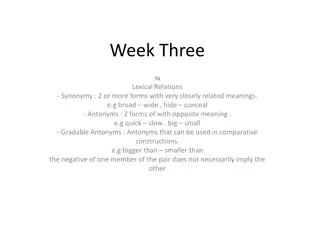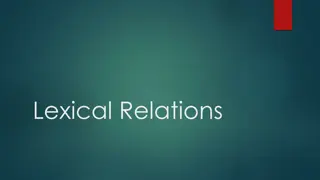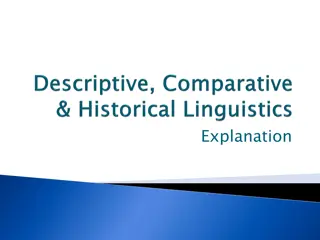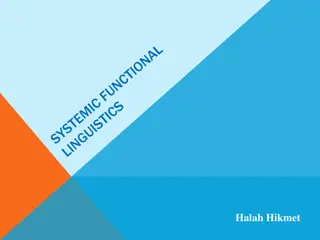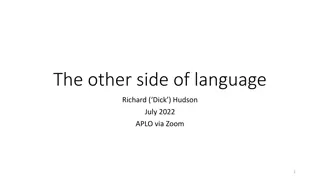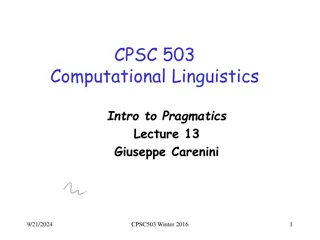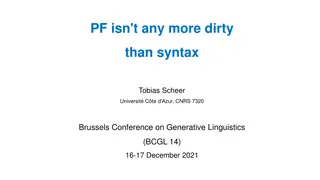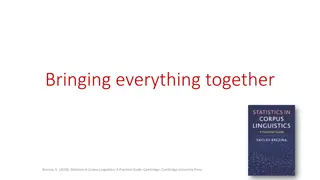Types of Meanings Explored in Linguistics
Various types of meanings in linguistic communication are discussed, including conceptual, connotative, affective, and illocutionary meanings. These meanings play a crucial role in language structure and communication, helping us understand the complexity of language semantics and expression.
Uploaded on Jul 29, 2024 | 1 Views
Download Presentation

Please find below an Image/Link to download the presentation.
The content on the website is provided AS IS for your information and personal use only. It may not be sold, licensed, or shared on other websites without obtaining consent from the author.If you encounter any issues during the download, it is possible that the publisher has removed the file from their server.
You are allowed to download the files provided on this website for personal or commercial use, subject to the condition that they are used lawfully. All files are the property of their respective owners.
The content on the website is provided AS IS for your information and personal use only. It may not be sold, licensed, or shared on other websites without obtaining consent from the author.
E N D
Presentation Transcript
Types of meanings Presented by : Amna Hussein Ali Amna Hussein Ali MA Student MA Student 2018 2018 . . 2019 2019
conceptual meaning conceptual meaning Logical, cognitive, denotative Central factor in linguistic communication, and integral to the essential functioning of language structure principle Contrastiveness principle Classification of sounds in phonology Sentence Positively negatively S. pred. /b/: + bilabial , + voice , - nasal Detr. N. v. comp. Detr. n. An island No man is
The aim of conceptual semantics is to provide a configuration of abstract symbols which is its semantic representation, to shows exactly what we need to know if we are to distinguish that meaning from all other possible sentence meanings in the language and to match that meaning with right syntactic and phonological expression
Connotative Connotative meaning meaning It is the communicative value an expression has by virtue of what it refers to, over and above its purely conceptual content. Referent Woman Criterial properties Non-Criterial properties adult , human, female Psychological Social Typical Putative
Facts 1. Connotation is talking about real world experience . 2. Connotative meaning is not specified to language, but is shared by other communicative system. 3. Connotative meaning is peripheral compared with conceptual meaning (relatively unstable ). 4. Connotative meaning is indeterminate and open - ended .
Affective Meaning Affective Meaning The meaning a piece of language conveys about the social circumstances of its use. .Crystal and Davy dimensions 1- Dialect 2- Time 3- Province 4- Status 5- Modality 6- Singularity . Synonyms do not exist Steed (poetic ) Horse (General) Nag ( stang ) Gee-gee (baby language )
Example: - -They chucked the stone at the cops, and then did a bunk with the loot. - -After casting stone at the police, they absconded with the money. Illocutionary force - -request - I haven't got a knife assertion Example: They chucked the stone at the cops, and then did a bunk with the loot. After casting stone at the police, they absconded with the money. Illocutionary force request - -assertion I haven't got a knife assertion - -request. assertion - -apology apology- -threat, etc. threat, etc. request.
Social Meaning Social Meaning The meaning that reflects the personal feelings of the speaker, including his attitude to the listener, or his attitude to something he is talking about. - you're a vicious tyrant villainous reprobate and I hate you for it ! - I'm terribly sorry to interrupt, but I wonder if you would be so king as to lower your voices a little. (Playful remark) [Intonation / tone of voice] - Will you belt up. (Sarcasm)
Reflected Meaning Reflected Meaning The meaning which arises in cases of multiple conceptual meaning, when one sense of a word forms parts of our response to another sense. The comforter and the Holy Ghost. (Trinity). Comforter / warm and comforting. Holy Ghost / awesome. One sense of a word seems to rub off on another sense through relative frequency and familiarity or through the strength of its associations.
Collecative Meaning Collecative Meaning Consists of the associations a word acquires on account of the meanings of words which tend to occur in its environment. Pretty / Handsome Woman good looking man Quasi - synonymous verbs. Wonder / stroll Tremble / quiver Not all differences in potential Co-occurrence need to be explained. Stylistic differences. Conceptual differences. (collecative meaning is an idiosyncratic property of individual words).
Associative Meaning Associative Meaning Reflected , collocative , affective , social meaning , all have more in conceptual meaning , why . The same open ended, variable character. Lend themselves to analysis. Contrast with conceptual meaning ( requires the postulation of intricate mental structures) Associative meaning can be studied systematically only by approximative statistical techniques.
Osgood and Sulci Proposal Osgood and Sulci Proposal {Devised a technique for plotting meaning in terms of a multidimensional semantic space} using data Speakers judgments recorded seven point scales. Bagpipe Good : : : : : : bad Hard : : : : : : soft Passive : : : : : : active 3 2 1 0 1 2 3 Three Dimensions: 1- Evaluation ( good / bad ) 2- Potency ( hard / soft ) 3- Activity ( active / passive )
Thematic Meaning Thematic Meaning It Itis isthe themeaning organizes Mrs The 11- -Have 2 2- -The 3 3- -The 4 4- -Have meaningwhich messagein interms Mrs..Bessie Thefirst Havedifferent Theactive Thepassive Havethe thesame whichis iscommunicated termsof ofordering smithdonated firstprize differentcommunicative activesentence passivesentence sametruth communicatedby bythe theway ordering,,focus donatedthe thefirst prizewas communicativevalues sentenceanswers sentenceanswers truthconditions wayin inwhich focus,,and prize(active) mrs..bessie values(different answerswhat answerswho conditions whicha aspeaker andemphasis speakeror orwriter writer organizesthe themessage Bessiesmith emphasis.. firstprize (active) smith(passive) (differentcontexts) whatdid didmrs whowas wasdonated donatedby bymrs bessiesmith (passive).. contexts) bessiesmith firstprize mrs..bessie wasthe thefirst smithdonate prizedonated donate? ? donatedby by? ?
Thematic meaning is either: - a matter of choice between alternative grammatical construction A man is waiting in the hall there is a man waiting in the hall - can be contrived by lexical means (Substitute Belong to for Owns) my brother owns the largest shop in the town the largest shop in the town belongs to my brother - It is stress and intonation Bill uses an electric razor The Kind of razor that bill uses is an electric one. Thematic meaning is either:
Demarcation Problems Demarcation Problems Problems Of Separating Conceptual Meaning From The More Peripheral Categories. The Difficulty Of Delimiting Conceptual From Connotative Meaning: Conceptual And Socio-stylistic Meaning He Stuck The Key In His Pocket. He Put The Key In His Pocked. Conceptually Synonymous Stylistically Different But - The solution is to conclude that quasi _synonyms differ on at least two planes of meaning.
Descriptive Meaning Descriptive Meaning Ideational ---- Halliday Descriptive ---- Lyons Referential ---- others Logical Characteristics. 1- Determines whether or not any proposition it express is true or false (logical and proposition). 2- Constrains what the expression can be used to refer to. (referential) 3- It is objective in the sense that it interposes a kind of distance between the Speaker and what he says. (displaced) 4- It is fully conceptualized. 5- Descriptive aspects of the meaning are exposed in the sense that they can be negated or questioned.
Dimensions of Descriptive Meaning Dimensions of Descriptive Meaning 1- Intrinsic dimensions Quality (red / green / walk / run ) That is not my father, that is my dad Intensity (large / huge ) it wasn t just large, it was huge Specificity it s a dog unilaterally entails it is an animal it is not an animal unilaterally entails its not a dog. (type specificity / part specificity- intensity specificity).
Vagueness generality A A- -I saw a reptile B B- -I saw a snake abstractness the nation of entailment is abstract and therefore not vague. 11- - Ill Ill- -defindeness (middle 2 2- -laxness(vs. strictness) the mourners stood in a circle round grave generality I saw a reptile I saw a snake abstractness the nation of entailment is abstract and therefore not vague. defindeness (middle- -aged) laxness(vs. strictness) the mourners stood in a circle round grave aged)
Basicness Cold 1- can be directly 2- concrete 3- observabl 4- basic 5- has spatio - temporal location A little/bet/slightly ..cold 1-can't be directly experienced 2-abstract 3-spexific 4-not observable 5-has no spatio-temporal location
Viewpoint 'some linguistic expression are clamed to encode the viewpoint of the speaker at the moment of utterance. the village is on the north side of the hill. the village is on the other side of the hill. the village is over the hill. the village is round the other side of the hill.
Non Non - - descriptive dimensions descriptive dimensions Expressive meaning Gosh ! 1- subjective 2- does not present a conceptual category to heaver 3- express an emotional state 4- Its validity is restricted to current state of the speaker 5- can not be put into past tense. 6- No proposition is expressed 7- prosodically gradable I am surprised
Expressive meaning does not contribute to propositional content Expletive Expressive meaning does not contribute to propositional content Expletive - Its freezing , shut the bloody (window some words have both descriptive and expressive meaning ) - It was damn cold (extremely only) ( descriptive ) - It wasn't all that cold (deny) Evaluative Its freezing , shut the bloody (window some words have both descriptive and expressive meaning ) It was damn cold (extremely only) ( descriptive ) It wasn't all that cold (deny) Evaluative - (horse/steed) expressive - (horse/nag) descriptive (horse/steed) expressive (horse/nag) descriptive
Evoked meaning Evoked meaning Dialect and register allegiance Dialectal variation is variation in language use according to speaker . Register variation is variation within the speech of a single community according to situation. Evoked meaning 1- has no propositional content 2- powerful Dialect ( geographical/temporal/social ) register ( field/mode /style ) field: (area of discourse ) mode: (different between language characteristic _ spoken , written ) style: (formality/informality)
Descriptive / Non Descriptive / Non Descriptive meaning Descriptive meaning 1- Descriptive meaning : It is a universally acknowledged fact languages can be used to make descriptive statements which are true or false according to whether the propositions that they express are true or false . Propositional Cognitive Referential
2- Non_decriptive meaning : non_ propositional Attitudinal expressive Affective emotive -It is the kind of meaning by virtue of which speakers express (rather than describe) -It is often held to fall within the scope of stylistics or pragmatics . -some kinds of expressive meaning are a part of sentence meaning . It is the kind of meaning by virtue of which speakers express (rather than describe)their beliefs , attitudes and feelings . It is often held to fall within the scope of stylistics or pragmatics . some kinds of expressive meaning are a part of sentence meaning . their beliefs , attitudes and feelings .
If a distinction is drawn between semantics and pragmatics , expressive meaning falls within semantics . Natural language vary in degree to which they grammaticalize expressive meaning . Expressive meaning is lexicalized in combination with descriptive meaning in many ordinary nouns , verbs and adjectives . It merges with what many authors have referred to as instrumental If a distinction is drawn between semantics and pragmatics , expressive meaning falls within semantics . Natural language vary in degree to which they grammaticalize expressive meaning . Expressive meaning is lexicalized in combination with descriptive meaning in many ordinary nouns , verbs and adjectives . It merges with what many authors have referred to as interpersonal instrumental, , social interpersonal, , social or or connative connativemeaning . meaning .




